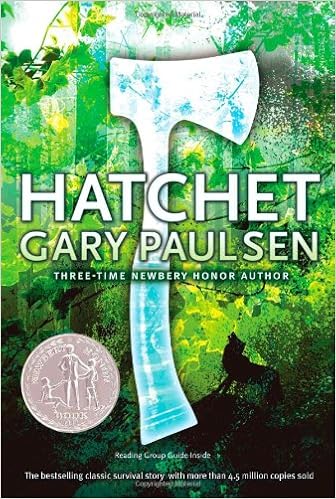
http://ecx.images-amazon.com/images/I/61Bdfhwu%2BOL._SX334_BO1,204,203,200_.jpg
Bibliographic Information:
Hatchet by Gary Paulsen
ISBN: 0-02-770130-1 (original hardcover)
1987 Bradbury, New York, NY
Plot Summary:
Brian Robeson is
traveling in a two passenger plane over Canadian wilderness when the pilot of
his plane has a heart attack. Brian makes the choice to crash land in a lake,
where he loses the pilot and any hope of help from an adult. Brian swims to
shore with just a hatchet to help him.
Brian learns to gather
food and hunt fish and whatever he can find in his environment to feed himself.
Through luck, he discovers that his hatchet can help him make fire and he is
able to both cook food and fight off the mosquitos that have been mercilessly
attacking him every evening.
After a tornado rips
through the area where Brian is camped, the downed plan is stirred up from the
lake and Brian is able to make a raft to get to the plane to it to find more
supplies. Brian drops his hatchet into the lake, but dives after it.
With the found
supplies, Brian has a transmitter. He turns on a distress signal, but has no
way of knowing that it worked and he discards it while examining all his new
supplies. That transmitter becomes his lifeline.
Critical Evaluation:
Because Brian is alone
in the woods, this story is told from the perspective of knowing what is going
on in his head. Somehow this 13 year old boy figures out how to survive in the wilderness
alone. This makes for an exciting story.
There is foreshadowing
in all of Paulsen’s writing, where he mentions advantages that Brian might have
if only he had made a different choice at a previous decision point. This
foreshadowing becomes predictable in Hatchet and the bad luck that Brian
experiences is never a surprise to the reader.
Although the
foreshadowing is strong, the excitement in the book never ceases. Brian
experiences one mishap after another, followed by victories of finding skills
or resources that help him survive. Discovering that he can make fire, when he
was just throwing his hatchet at an intruding animal, was the ultimate good
luck in this experience.
Critics compare Paulsen’s
writing to Ernest Hemingway and Jack London (2006 Kellman). He demonstrates the
naturalism of London and the straight forward narrative of Hemingway. This
brings adventure stories to a new generation of readers who devour this magical
time in nature.
Reader’s Annotation:
Brian Robeson must survive in the wilderness with only his hatchet.
Author Information:
Gary Paulsen was born
in 1939 in Minneapolis, Minnesota. He ran away from home at age fourteen to
travel with a carnival. He began writing for a living many years (and jobs)
later, and he published numerous articles and books for adults before writing
his first book for young people. Now he writes books that he'd want to read if
he were a kid. Of all the books he has written, Hatchet is one of his
favorites. He says, "It struck some nerve that I still don't
understand."
Paulsen researches his
books very carefully and thoroughly; he calls this research "personal
inspection at zero altitude." Whenever possible, he tries to experience
firsthand the challenges his characters face, so that he can make his writing
vivid and real.
Retrieved from https://www.eduplace.com/kids/hmr/mtai/paulsen.html
Genre(s):
Action/Adventure
Curriculum Ties: Literature
Booktalk Ideas:
Reading level: Grade 7+
Interest age: 12+
Challenge Issues: This book fits our library's selection criteria and is highly awarded.
Why I chose this book:
I
chose this book because it is an award winning novel with a very exciting story
that draws in readers looking for an action packed narrative.
Citations:
"Gary Paulsen American Literature Analysis" Masterpieces of American Literature Ed. Steven G. Kellman. eNotes.com, Inc. 2006 eNotes.com 4 Aug, 2015 <http://www.enotes.com/topics/gary-paulsen/critical-essays#critical-essays-analysis>
https://www.eduplace.com/kids/hmr/mtai/paulsen.html 8/04/2015
No comments:
Post a Comment